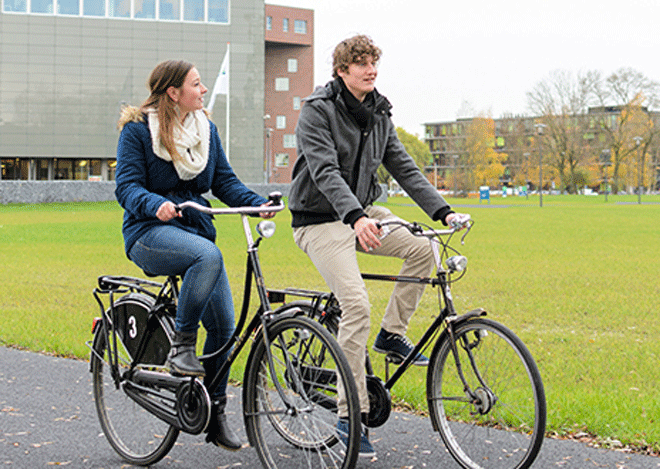Prevent study stress… ask for help
Will your child receive the results of his or her final exams this summer? Will you be hanging out the flag? Wonderful, congratulations! Your child will probably start studying in September. This is the beginning of another exciting period. Studying is both fun and challenging. But students also have to work hard. And things don’t always go smoothly. Many students suffer from stress. But the student can do something about this. And a parent can lend a hand in the background. Prevent study stress… ask for help (in het Nederlands, Dutch version).

Studying is fun and challenging. But things don’t always go smoothly. Prevent study stress… ask for help.
Tip 3: Prevent study stress… ask for help
Quite a number of students suffer from tension and stress when they study. This is both unfortunate and a hindrance. But a student can do things to prevent study stress. And as a parent you can do something to prevent your child from experiencing unnecessary study stress. This month, I’m publishing five articles about this for students and parents.
It’s very important to talk about things that don’t go as you’d hoped. Young people sometimes think that everything has to be perfect. And if something goes wrong, it’s often ‘erased’. I often hear: ‘Now that I’m studying, I’m confronted for the first time with something going ‘wrong’, and it’s also the first time that I’ve had to deal with this disappointment by myself.’ It’s true that students are responsible for their own lives. But students aren’t completely alone. Are you a parent? Talk to your child about ‘auxiliaries’. In this article, I’ll explain which ‘auxiliaries’ are available.
Student: Talk to older students
Some subjects are truly difficult. And some are boring. A teacher can prove disappointing… a book is difficult to read. Especially in the first year, a study is not what a student had expected. Those interesting projects and topics they heard about on the Introduction Day aren’t (yet) possible. The method of teaching is completely different. There’s a lot more independent work. And that can be difficult.
My advise to students: talk to older students. Maybe they’ll only have that boring teacher in the first year. The exam that they failed was difficult for everyone, and lots of students have to repeat that subject… Older students can put a study into perspective. Some obstacles disappear as the programme progresses. Older students can help by sharing their experiences.
Student: Talk to your study advisor or study career counsellor
The study advisor or study career counsellor can be compared to the mentor at secondary school. However, there’s also a difference. A mentor kept an eye on your child. This is different at a hbo or university, where students themselves have to approach their study advisor. This can be because of all sorts of things related to the study. Is a subject too difficult? Or too easy? Are you studying really hard, but not earning the credits you need? The study advisor can answer your questions. He or she has all kinds of suggestions about adjusting the programme where possible. He or she can also refer a student to other ‘auxiliaries’, such as the student dean or student psychologist. Or perhaps a training programme to improve study skills.
Student: Talk to the student dean
The student dean has a different task to that of the school career advisor. The latter helps in choosing a programme of studies. The student dean helps students who have serious problems, such as personal problems caused by illness or sorrow in a student’s personal life or family. The student dean also knows about all the different regulations that apply to students with an obstacle or a handicap.
The student dean needs to know as early as possible if he or she can do something to help a student. So in the first year, it’s important that students ask for help. In this year students have to earn a minimum number of credits. They are given a Binding Study Advice. If they don’t earn the required credits, they have to stop their programme. But if there are special circumstances, the student dean can offer to arrange something. But the student really has to ask for help on time. ‘Prevent study stress… ask for help’ definitely applies to students who find themselves in a special situation.
Student: Talk to the student psychologist
Is a student suffering from fear of failing, stress, homesickness or loneliness? These problems occur all too often. In a couple of short meetings, the student psychologist can help a student to move on. There are also training programmes and courses to teach people how to deal with problems like these. The student psychologist has all the details. And if necessary, he or she can also refer a student to other professionals. Prevent study stress – ask for help…

Studying is fun and challenging. But things don’t always go smoothly. Prevent study stress… ask for help.
Parent: Talk to the student
The above-mentioned auxiliaries work at both hbo’s and universities. But as a parent you are also very important to your child. Even more often than secondary school pupils, students say that their parents are among their most important advisors. Your role has changed. When your child was very young, you bore all of his or her responsibility. Now that your child is an adult, he or she is responsible for his or herself. But fortunately, parents of students often still feel involved with their child.
‘The shift from parental responsibility to parental involvement’ is quite a difficult process. On the one hand, you have to ‘let your child go’; on the other hand, you have to ‘stay with them’. The involvement, mutual love and open contact have to remain. Preferably throughout your lives.
Contact with the ‘auxiliaries’
The study advisor, student dean and student psychologist in the first instance only have contact with the student out of respect for the student’s privacy. If you have finished secondary school and are now studying, you are an adult even if you aren’t 18 yet. Of course, parents may have reasons for wanting to contact the student dean, for example, in special circumstances. However, this is only possible if the student and the staff member involved agree. But you can still play a role as a parent. Particularly by stimulating your child to ask for help on time. Prevent study stress… ask for help! And seeking help on time isn’t a sign of weakness, but rather one of strength.
Five tips on study stress for parents of students
tip 1 prevent study stress… learn to choose what really suits you
tip 2 prevent study stress.. don’t drive yourself crazy
tip 3 prevent study stress… ask for help
tip 4 prevent study stress and research on study success
tip 5 prevent study stress and credits
Why these tips?
An increasing number of students suffer from stress. That’s worrying. Student psychologists, student deans, study advisors, student physicians and study career counsellors regularly give advice on preventing study stress. On this blog too. On the basis of their advice, I have written five tips for parents. Of course students are adults and responsible for their own welfare. But it’s fine if parents give some support when necessary. So tip 3: prevent study stress… ask for help. Don’t forget to read the other tips as well.

